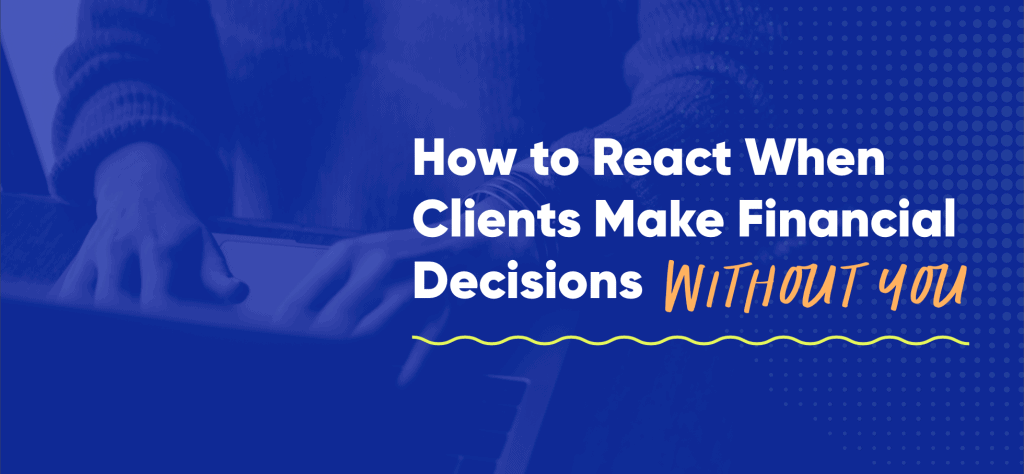How to React When Clients Make Financial Decisions Without You

As a financial planner, you’re supposed to give your clients the advice and expertise they need to make wise financial decisions, right? So what happens when a client just decides something without getting your input? And what if that decision is something you would have advised against?
This happened to me very recently. Last month, I got an email from a client saying that they bought a house and needed multiple hundreds of thousands of dollars for the down payment.
It wasn’t just that they needed the money, though. They were asking if I thought they were in a good place to pull the funds from their retirement account after putting an offer in. They hadn’t consulted me in the decision-making process but now they wanted to know whether they could afford a $2,000/month increase in mortgage payments.
It’s normal to feel upset
Honestly, the whole email could have been frustrating for me. And I know a lot of financial planners get upset (rightfully so) at these kinds of situations.
Our clients hire us to help them make better financial decisions, so it’s reasonable for us to expect them to listen to our advice. When they don’t, it’s easy to get frustrated.
But as much as that frustration is understandable, it doesn’t really help anyone. Most of us financial planners automatically respond by thinking, “They should listen to me because I’m an expert.” But even if that is true, it’s not really a useful response.

Take some time to cool down
One of the best things we can do in a situation like this is to take a step back and figure out how we can offer support. For me, I know that the client situation had changed and they would likely be able to afford their new house. By taking the time to think through the situation before responding, I was able to keep the planner/client relationship intact and continue providing help and advice.
In reality, our job is to help our clients however they want us to help them. And sometimes that won’t be in the way that we might think is best. But our role as financial planners is to support our clients, not just be right.
Look at the long-term
One thing I’m focusing on is thinking about the big picture. Is this decision one that I would have advised? Maybe not. But is it really going to wreck her entire financial plan? No. I can help them mitigate the damage and continue working toward a financial plan that’s based on their values.
Give your clients the help and support they need
If you haven’t yet had this type of experience, chances are you will at some point in your career. The truth is that clients are people, which means they sometimes make mistakes and bad decisions.

Is it frustrating when they make those poor decisions without consulting you first? Yes. But it’s essential to remember that you aren’t responsible for your client’s choices – you’re there to support them, even if it means helping them recover from a choice you would have advised against.
Have you ever dealt with a client who only came to you after making a big financial decision? How did you deal with it? Let me know in the comments!
Handling frustrating situations like this is something that’s hard to learn from a textbook. It’s one of those things that comes with real-world experience. Want to start gaining that experience as soon as possible? Join Amplified Planning CORE, our innovative training program. You’ll get to watch planning sessions with real clients and get “play-by-play” commentary from expert planners. It’s the perfect complement to traditional course material. Find out more today!
